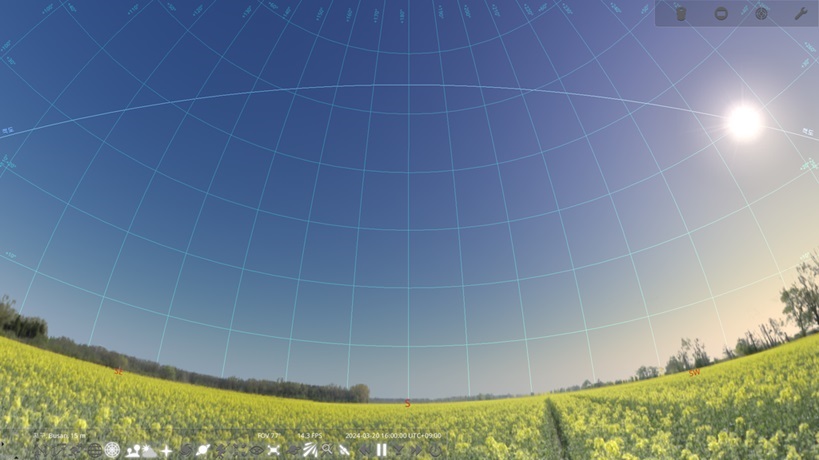.
Equinox Blues
Welcome to spring! The last snow may be past,
_and bright blue frames the parting clouds.
The sun rides longer in the sky, at last,
_than lost to night’s slow–ebbing shrouds.
The weather’s clearing but, alas, not warming;
_light sparkles on our coldest day
since winter last. No honeybees are swarming:
_they’re told, “rest hive–bound.” They obey.
A theory starts a–budding in my brain
_(peculiar, fancy–filled theater)
that never will the summer cross again
_the thin belt known as the equator;
instead, just like the pendulum in clocks,
_the axis of our globe will swing,
retreating from the vernal equinox
_as northerners lament lost spring;
then steadily pursue its novel course,
_stolidly winter solstice–bound;
and reaching it, stilled by some unknown force,
_rest three months while the earth spins ‘round,
And so on … But no—best presume somehow
the earth will muddle through: it has till now.
.
.
Spring’s Summons
__The sun’s rays, duly paced
from February till the end of winter,
__have steadily erased
the thick carpet of white. They prompt the Tinter
__out of long hibernation:
“Well, act! You see the drab and sullen straits
__about. Time for elation:
to green, pink, blue, and yellow raise the gates,
__“and vibrant purple, too—
not just from ground and vine, from shrub and tree,
__but more: the lively view
should shine in window panes for all to see.
__“Let marshes, ponds, and lakes
cast off their pallid stillness; let our power
__gleam on their swells and breaks,
from break of dawn till our departing hour.
“That done, the sounds to suit will soon be heard:
leaves rustling, brooklet gushing, chirping bird.”
.
.
Julian D. Woodruff writes poetry and short fiction for children and adults. He recently finished 2020-2021, a poetry collection. A selection of his work can be read at Parody Poetry, Lighten Up Online, Carmina Magazine, and Reedsy.















“Spring’s Summons” does something striking: it gives God a new name.
The main speaker is “the Tinter,” who wakes up from winter hibernation and acts to bring back all the multiplex hues of springtime. God is imagined as a sleeping painter who, after waking up, decides to spread color everywhere. This shows how the necessity of rhyme can frequently lead to an unexpected leap in diction-choice and in figurative usage. “Tinter” was clearly generated in the act of composition by the need to find a rhyme with “winter.” And so all of a sudden we have a new idea about God.
Thank you for your comment, Joseph. Of course, you’re right (and a good thing for me “winter” is not as bad as “orange”). But …
Rhymes should meet the cool gaze of the squinter.
By no means is God merely “the Tinter.”
So I rush, keeping pace with the sprinter,
the intent in my word not to hnder:
We run about with hose and trowel
in weather fair and often foul,
tending the gardens ‘round our homes,
but really we’re like garden gnomes;
for absent Him, what can we do?
J___ of all trades is He, it’s true.
When you have a sore throat, it’s best
to give varied Strepsils a test;
and I find the lozenge
that’s flavoured like orange
tastes better than all of the rest.
Dear Julian,
I loved reading your thoughtful musings about the change of seasons. My favorite is the final couplet, which is as musical as the “brooklet gushing” and the “chirping bird.”
Gigi
Thank you, Gigi. I tried in “Summons” to reverse my frequently sour response to weather (“Blues”) and capture the elation from Aslan’s bringing spring to Narnia in The Lion, the Witch, and the Wardrobe. You seem to catch that intended spirit, for which I’m grateful.
What an imagination, Julian! The globe deciding to roll backward from the spring equinox! That sounds like singing the blues, for sure. I’m glad you decide (on the basis of its past performance) that earth will muddle through. Yours is far from the worst doomsday theory. Glad too that you brighten up in “Spring’s Summons.” Interesting that the first feature called for is color. From my days in places where the season could be slow to arrive, I recall forsythia gold blooms springing before green leaves came out.
Thank you, Margaret. I decided (like most) was guilty of too much kvetching and instead should do a minute bit to pull the earth from a spin in the cosmic shade with its blues on parade (borrowing from you & Dorothy Fields).
And, Margaret, I’m with ya–
Forsooth, forsythia!
What I took from these was especially: Don’t wait for Spring but be ready when it comes, at all cost. Great thoughts here, well expressed.
Thank you, CB. Right you are, and be prepared, too, for bumps, hitches, and apparent changes of mind, whatever the season.
I love the sing-song voice and simplicity of ‘Equinox Blues’. You’ve broken down some complex astronomical ideas into easily understandable verse. No easy job.
I look forward to seeing the Tinter’s works on my visit to England in the summer.
Thanks for the reads, Julian
Thanks for reading, Paul. Glad you enjoyed “Blues.”
You remind me of ,my visit with my wife to York in the summer of 1976. From our hotel window we could look out at ~9:30 pm and see the sun’s light on the west portal of the Minster. I took a photo from that window, which I have somewhere …
Paul, I missed your limerick (above) till now. On orange: close, so half a cigar?